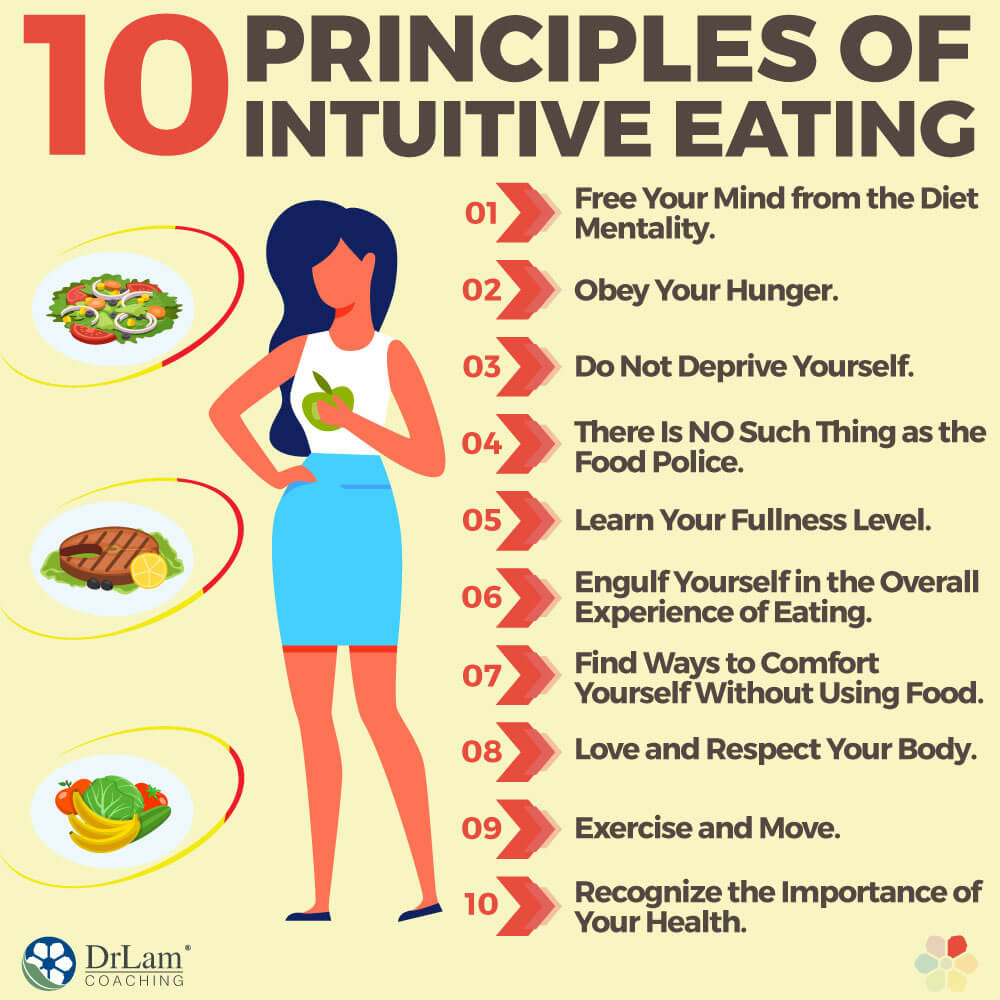 Some people have spent a lifetime fighting with their bodies. They try this diet or that method of eating, follow the most current food fads, and still ending up unsatisfied, unsatiated, and overweight. Society has painted a picture of what we should look like, what we should eat, and pretty much how we should be living our lives which often leads to unmet goals, depression, and anxiety. Eating shouldn’t be stressful. If it is, then you need to reevaluate your diet and your life. Meal times alone, or with friends and family should be a cherished and sacred time. You are feeding your body, the vessel that provides you with life. Intuitive eating should be incorporated into everyone’s life for a balanced approach to nutrition.
Some people have spent a lifetime fighting with their bodies. They try this diet or that method of eating, follow the most current food fads, and still ending up unsatisfied, unsatiated, and overweight. Society has painted a picture of what we should look like, what we should eat, and pretty much how we should be living our lives which often leads to unmet goals, depression, and anxiety. Eating shouldn’t be stressful. If it is, then you need to reevaluate your diet and your life. Meal times alone, or with friends and family should be a cherished and sacred time. You are feeding your body, the vessel that provides you with life. Intuitive eating should be incorporated into everyone’s life for a balanced approach to nutrition.
Intuitive eating is the idea that we need to listen to our body’s cues for what is most nutritious for us. It ties the body and mind together to create an “all food is ok” type of approach. It fosters awareness of your body, thoughts, and surrounding environment. It's a personal process that honors healthy eating based on the direct messages of the body, and not the scale. It is intended to meet one’s physical and psychological needs rather than going against the grain and forcing a diet that causes multiple complications.
Intuitive eating is not a diet. It’s not a meal plan, and there is no “falling off the bandwagon,” “blowing it,” or failing. There is no calorie counting, no carb restrictions, and no point systems. It is a healthy journey of self-discovery through food and eating.
Intuitive eating is liberation and empowerment. Only you know what your body feels like, it's satiety levels, and the thoughts and emotions that go along with eating. Eating is a different and unique experience for everyone. It's time to move away from the diet culture and weight obsession, and think in terms of a healthy mind and body.
Intuitive eating will help you create a peaceful relationship with mind, body, and food that will leave you satisfied and not wanting more. It’s about paying very close attention to the whispers of your body and acting according to its subtle voice.

The creators of the intuitive eating movement have developed 10 principles they believe define the mind-body connection with food. They are:
 Find Ways to Comfort Yourself Without Using Food. Evaluate if you are eating from feelings such as anxiety, anger, loneliness, or boredom. Yes, food may comfort you momentarily by distracting your mind from an uncomfortable thought, but it will not solve your problems. In fact, eating from emotions will most likely make you feel worse. It usually involves overeating and indulging, causing food hangovers.
Find Ways to Comfort Yourself Without Using Food. Evaluate if you are eating from feelings such as anxiety, anger, loneliness, or boredom. Yes, food may comfort you momentarily by distracting your mind from an uncomfortable thought, but it will not solve your problems. In fact, eating from emotions will most likely make you feel worse. It usually involves overeating and indulging, causing food hangovers.These 10 principles of eating are everything you need to implement sustainable methods of eating foods. Ditch the diets, as they can actually be detrimental to your weight and health, and enter into an intuitive eating lifestyle
The results are in. Weight-loss dieting is not a sustainable way to eat and live. New studies are continually showing that dieting and restricting foods in order to lose weight ironically often leads to weight gain. Even worse, the preoccupation with weight loss leads to low self-esteem, body dissatisfaction, and a negative impact on physical and mental health. Scientists are even partly attributing diet-induced weight gain to the obesity epidemic that is now taking place in our society.
One such study on the subject that took place in Finland and evaluated over 2,000 sets of twins aged 16 to 25 years old. The results were purposely independent of genetics and showed an overwhelming association between dieting and weight gain. When one twin participated in at least one weight loss method, they were two to three times more likely to be overweight compared to their twin counterpart.
Other compelling studies show the same results. And all results are independent of age, gender, and athletic abilities.
 The body views dieting as a type of starvation. It has no idea you are purposely restricting your food consumption and enters into a primitive survival mode in which it begins to slow down metabolism. It’s at this point that food cravings may increase. With each new diet, the body adapts, leading to a “rebound” weight gain. Dieting fails people and ironically contributes to their subsequent weight gain. In addition, it disconnects a person from their own hunger and satiety cues, leading to mistrust between body and mind.
The body views dieting as a type of starvation. It has no idea you are purposely restricting your food consumption and enters into a primitive survival mode in which it begins to slow down metabolism. It’s at this point that food cravings may increase. With each new diet, the body adapts, leading to a “rebound” weight gain. Dieting fails people and ironically contributes to their subsequent weight gain. In addition, it disconnects a person from their own hunger and satiety cues, leading to mistrust between body and mind.
If you would like to have a healthier lifestyle when it comes to your eating, it's best to become consciously aware of your meals and snacks. Many nutritionists feel what you eat can either help or harm you. Make every meal count. Make every bite satisfy you emotionally, benefit you physically, and contribute to your optimal wellness.
Ready to embark on your intuitive eating voyage? Here are some helpful ways that intuitive eating professionals recommend getting started:
Nutrition is important for everyone but extremely important to a healing body, and it could be one of the keys to recovery from Adrenal Fatigue Syndrome (AFS) a chronic ailment brought on by stress. AFS recovery relies heavily on proper nutrition and supplementation to regenerate the health of the adrenals, as well as other organs. Since the body is one intricate system of six interrelated systems, what’s known as the NeuroEndoMetabolic (NEM) Stress Response system, when one organ is stressed and begins to fail, it affects the rest of the body. A proper diet is imperative to begin recovery and keep the other affected organs running properly and at optimal levels.
Before beginning intuitive eating, it is imperative that you speak to a professional in the medical field who specialized in AFS and learn about the diet that is specifically tailored to meet the nutritional needs of those suffering from the ailment. At the various stages of AFS, the body could require different food options as absorption rates and energy levels could vary. Due to disrupted metabolism, many need frequent meals and snacks. During the recovery process for AFS, the body tends to change, so intuitive eating should be adjusted accordingly. More attention to listen to the body’s whisper is needed. Generally speaking, the further your adrenal fatigue, the less your diet should be structured. It should be more intuitive in nature until your condition is stable.
 Intuitive eating is a very stress-free way to approach eating, and that is a very important and beneficial component for adrenal fatigue sufferers. Removing as much stress as possible is a great tool in adrenal recovery and healing. The intuitive eating lifestyle may or may not be right for those who are in progressed stages of any disease, and it's always best to discuss dietary needs with your health care provider.
Intuitive eating is a very stress-free way to approach eating, and that is a very important and beneficial component for adrenal fatigue sufferers. Removing as much stress as possible is a great tool in adrenal recovery and healing. The intuitive eating lifestyle may or may not be right for those who are in progressed stages of any disease, and it's always best to discuss dietary needs with your health care provider.
© Copyright 2019 Michael Lam, M.D. All Rights Reserved.
Intuitive eating takes all the stress out of dieting. However, those who suffer from chronic illnesses such as Adrenal Fatigue Syndrome must take precautions with their nutrition, and it is often recommended that they follow a strict AFS diet. It is best to talk to a professional about what your body needs with AFS.
